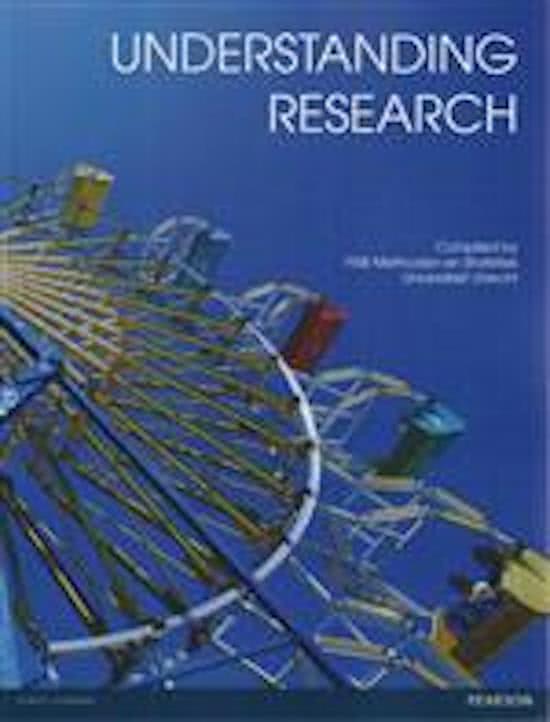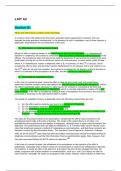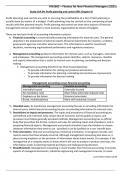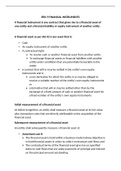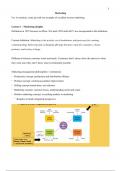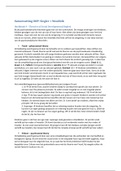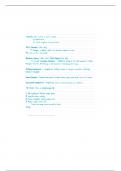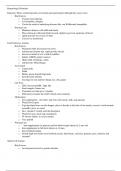W. Lawrence Neuman
Chapter 1 Why do research?
Research in an ongoing process of searching and working toward the truth.
Critical thinking is a way to think and see things. Being very aware, judging
carefully and questioning by not accepting just anything that comes along.
Empirical evidence is evidence of actual events occurring in the world that
come from direct or indirect observations.
We use the word research for
- Closely reading and studying specific documents.
- Gathering preexisting information from academic journals or official
government reports and making sense of it.
- The process of applying accepted techniques and principles.
- Applying critical thinking and adopting an orientation.
Quantitative data is evidence in the form of numbers. This can be gathered by
experiments, surveys, content analyses and existing statistical sources.
Qualitative data is evidence in the form of visual images, words or sounds. This
can be gathered by ethnographic field research (closely observing a small
group of people over a length of time) and historical-comparative research
(examining aspects of social life in a past historical era or across different
cultures).
Purpose of research
- Exploratory research is research into a new, previously unknown topic to
develop a general understanding and refining ideas for future research.
Focusses on questions like ‘what?’.
- Descriptive research is research that presents a quantitative or
qualitative picture of an event, activity or group. Describing in depth.
Focusses on questions like ‘how?’ and ‘who?’.
- Explanatory research is research that attempts to test a theory or
develop a new accounting of why activities, events or relations occur as
they do. Questions like ‘why?’.
- Evaluating research is applied research that is designed to learn
whether a program, product or policy does what it claims to do. So it
evaluates things. Questions like ‘does it work?’
Orientations of research
- Basic research is research to extend basic understanding and
fundamental knowledge about the world by creating and testing theories.
(fundamenteel wetenschappelijk onderzoek)
- Applied research is research to answer a specific practical question and
give usable answers in the short term. (toegepast onderzoek)
Chapter 2 Planning a study
A research proposal is a detailed plan for conducting a study on a specific
research question, that includes a literature review and specific techniques to be
used.
, An appropriate topic
- Generalize. The topic is beyond one isolated unique instance.
- Social pattern. The topic has regularity or some kind of structure that
describes interconnections among a set of situations, relationships, etc.
- Aggregates. It applies to a collection of people or other units, like families
or hospitals.
- Empirically observable. It appears in the observable world in a way that
we can detect and observe it using our senses.
A literature review is a summary of previously conducted studies on the same
topic or research question.
Types of periodicals
- Peer-reviewed scholarly journal
o Purpose: report on empirical research studies to professionals and
build scientific knowledge
o Strength: highest quality, most accurate and most objective with
complete details
o Weakness: technical, difficult to read, requires background
knowledge or training, not always about current issues
- Semi-scholarly professional publication
o Purpose: disseminate and discuss new findings and their
implications for professionals and the educated public
o Strength: generally accurate, somewhat easy to read
o Weakness: lacks full detail and explanation, often includes opinion
mixed in with discussion
- Practitioner magazine or newsletter
o Purpose: provide a communication forum for working professionals
o Strength: current news and debates on relevant issues
o Weakness: narrow focus and rarely build general knowledge
- Opinion magazine
o Purpose: present value-based ideas and opinions for professionals
and educated public
o Strength: carefully written and reasoned
o Weakness: one-sided view and highly value based
- Mass market magazines for the public
o Purpose: entertain, present and discuss current events for lay public
o Strength: easy to read, easy to locate
o Weakness: often inaccurate and incomplete
Types of publication
- Scholarly journals: Most of the articles are reports about original
research study, peer-reviewed, they have references and are part of an
indexing location system
- Books: Monographs contain details of a long complex study or a set of
interconnected studies. Readers contain articles on a topic, original or
gathered from journals. Edited collection is a collection of new research
reports, articles reprinted from scholarly journals or a mixture of both.
- Government documents: all kind of governments and agencies sponsor
research studies and publish the reports. Most of the time difficult to find.
- Ph.D. dissertations: graduating students write their dissertation thesis,
which can be published as an article. They report on original research.

